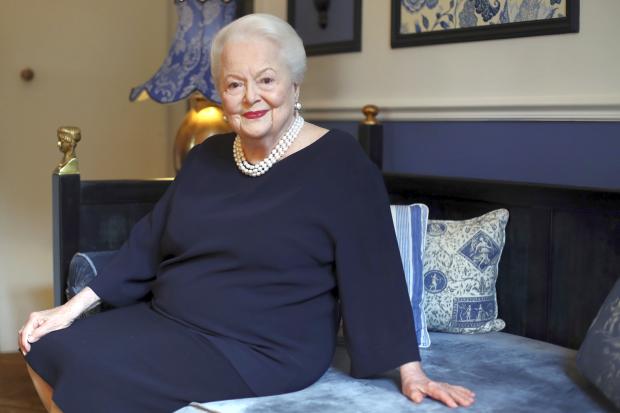
In this photo, taken June 18, 2016, US actress Olivia de Havilland poses during an Associated Press interview, in Paris. De Havilland is launching her own sequel to the TV series “Feud.” The double Oscar-winning actress is suing FX Networks and producer Ryan Murphy’s company, alleging unauthorized and false use of her name and invasion of privacy. The suit was filed in Los Angeles on Friday, June 30, 2017, one day before de Havilland turned 101. (Photo by THIBAULT CAMUS / AP)
LOS ANGELES (AP) — Hollywood great Olivia de Havilland has launched her own sequel to the TV series “Feud” — a lawsuit.
The double Oscar-winning actress filed suit Friday against FX Networks and producer Ryan Murphy’s company, alleging the drama inaccurately depicts her as a gossipmonger and is an invasion of privacy.
The suit was filed in Los Angeles on Friday – one day before de Havilland turns 101. The actress, whose credits include the role of Melanie Hamilton in “Gone with the Wind,” lives in Paris.
De Havilland’s suit alleges that “Feud: Bette and Joan,” about the testy relationship of Bette Davis and Joan Crawford, used her name and identity without permission or compensation.
FX Networks declined comment Friday. Representatives for Murphy, who co-created the hit series “American Horror Story” and “Glee,” didn’t immediately respond to a request for comment.
Catherine Zeta-Jones played De Havilland in the series, which aired earlier this year. The anthology series’ next announced chapter is about the ill-fated marriage of Britain’s Prince Charles and Princess Diana.
While De Havilland is “beloved and respected by her peers” and has a reputation for integrity and honesty, the series depicts her as “a hypocrite, selling gossip in order to promote herself” at the Academy Awards, the suit says.
This is false, the suit against FX and Ryan Murphy Productions contends.
“She has refused to use what she knew about the private or public lives of other actors (which was a considerable amount) to promote her own press attention and celebrity status,” a valuable aspect of her character, the suit says.
It argues that putting “false statements into a living person’s mouth and damaging their reputation is not protected by the First Amendment because the work is cloaked as fiction.”
Suzelle Smith, an attorney for de Havilland, said in a statement that FX was “wrong to ignore Miss de Havilland and proceed without her permission for its own profit.”
The actress believes FX’s actions raise important principles that affect other celebrities, Smith’s statement said.
The suit seeks unspecified compensatory and punitive damages for emotional distress, damage to her reputation and past and future economic losses, as well as an injunction barring the defendants from using her name or image in the series or otherwise.
De Havilland won Oscars for 1946’s “To Each His Own” and 1949’s “The Heiress,” and was nominated for three other films, including “Gone with the Wind.” Her later projects included TV’s “Roots: The Next Generations” and “North and South, Book II.”
The statement from her lawyers, Smith and Don Howarth, said de Havilland is “no stranger to controversy with the powerful Hollywood production industry.”
In 1943, she sued Warner Bros. over her contract.
The “landmark decision” in her legal victory set the outside limit of a studio-player contract at seven years, including suspensions, according to Ephraim Katz’s “The Film Encyclopedia.”